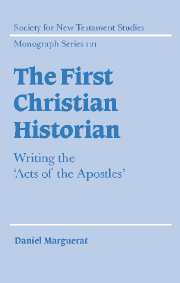Book contents
- Frontmatter
- Contents
- Preface
- 1 How Luke wrote history
- 2 A narrative of beginnings
- 3 The unity of Luke–Acts: the task of reading
- 4 A Christianity between Jerusalem and Rome
- 5 The God of Acts
- 6 The work of the Spirit
- 7 Jews and Christians in conflict
- 8 Ananias and Sapphira (Acts 5. 1–11): the original sin
- 9 Saul's conversion (Acts 9; 22; 26)
- 10 The enigma of the end of Acts (28. 16–31)
- 11 Travels and travellers
- Bibliography
- Index of passages
10 - The enigma of the end of Acts (28. 16–31)
Published online by Cambridge University Press: 22 September 2009
- Frontmatter
- Contents
- Preface
- 1 How Luke wrote history
- 2 A narrative of beginnings
- 3 The unity of Luke–Acts: the task of reading
- 4 A Christianity between Jerusalem and Rome
- 5 The God of Acts
- 6 The work of the Spirit
- 7 Jews and Christians in conflict
- 8 Ananias and Sapphira (Acts 5. 1–11): the original sin
- 9 Saul's conversion (Acts 9; 22; 26)
- 10 The enigma of the end of Acts (28. 16–31)
- 11 Travels and travellers
- Bibliography
- Index of passages
Summary
The way the book of Acts ends is surprising. This enigmatic conclusion has resisted centuries of enquiry. At the end of his work, Luke presents the activity of Paul, a prisoner, in the capital of the Empire. After the troubled voyage from Caesarea, Paul settles in, accompanied by a guard (28. 16). After this there is the theological debate with the delegation of Roman Jews (28. 17–28), and the book ends with the apostle evangelizing in the imperial city (28. 30–1). Considering the importance of the end of a literary work, and the effect the last image may have on the reader or hearer before leaving the narrative world, Luke's choice is perplexing.
The first difficulty is not what the narrative conclusion affirms, but what it does not. Why does Luke remain silent about the appeal to Caesar, which represents the avowed motive for Paul's transfer to Rome (28. 19)? The ending of Acts comes after the interminable wait for the apostle's trial, which is announced continually throughout the book (23. 11; 25. 11–12; 26. 32; 27. 24), but never occurs; it disappoints the expectation of the reader. One can understand why this expectation has intrigued exegetes, from the early Fathers onwards. Why did Luke remain silent about the outcome of the trial, whether favourable (the release of the apostle) or not (the death of Paul)? Has Luke kept silent intentionally, or was he not able to say more?
- Type
- Chapter
- Information
- The First Christian HistorianWriting the 'Acts of the Apostles', pp. 205 - 230Publisher: Cambridge University PressPrint publication year: 2002



